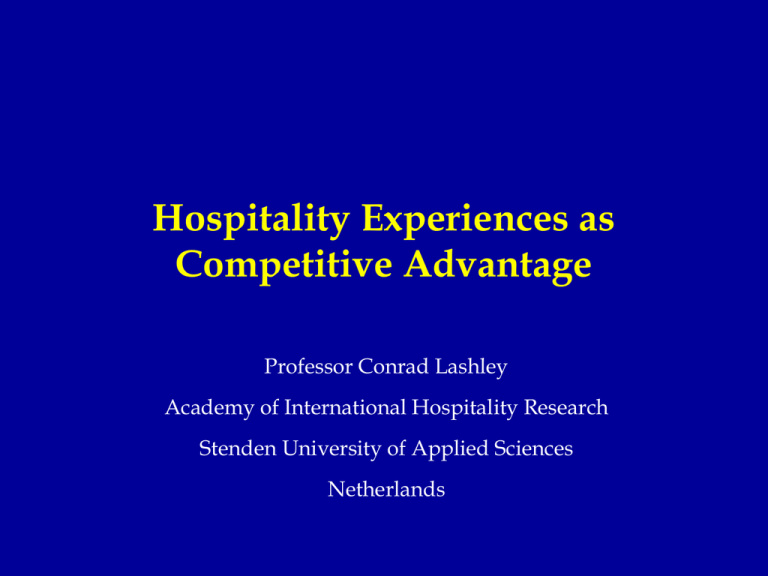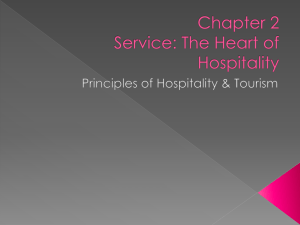marketing hospitality and tourism experiences
advertisement

Hospitality Experiences as Competitive Advantage Professor Conrad Lashley Academy of International Hospitality Research Stenden University of Applied Sciences Netherlands Hospitality Management and all that • Program origins – applied management – hotel, restaurant, bar services – commercial/non-commercial settings • Hotel and catering management – original title • Program content – operations and management • How to do agenda? • Content/context hotel dominant – research • Hospitality emerges as a term – USA later UK and internationally • Hospitality and hospitableness – opens avenues of study Euhofa14 Figure 1: The domains of hospitality Host Physiological needs Psychological needs Extraction of surplus Services for pro it Producer limitations Market limitations PRIVATE SOCIAL Dealing with strangers Mutuality Status and prestige COMMERCIAL HOSPITALITY EXPERIENCES Euhofa14 The social/cultural domain • Forgotten truths? Early Middle Ages in the UK – (Heal, 1990) Reports strong cultural obligations to offer hospitality to strangers, travellers and the homeless. In particular, the host was required as a moral and sacred obligation to offer protection and safety to the guest as well as shelter and nourishment. Euhofa14 Anthropologists Common truths Converting strangers into friends – many societies (Selwyn, 2000) Hospitality is offered and the extent or limitation of it is based on the needs and the purpose of the guests/strangers. (O’Gorman, 2007) Euhofa14 Historical Evidence Shakespeare’s plays – 16/40 hospitality features Macbeth - Duncan, is killed whilst he is a guest in the Macbeths’ house (Coursen, 1997) Lady Macbeth says, ‘Woe, alas! What, in our house?’ (Shakespeare, 1607, Act 2, Scene 3, page 5) King Lear - host Gloucester, who is about to have his eyes plucked out says to his guests, ‘What mean your graces?-- Good my friends, consider You are my guests: do me no foul play, friends’ (Shakespeare, 1601, Act 3, Scene 7, page 31) Euhofa14 Philosophers Telfer (2000) genuine hospitality/hospitableness •The desire to please others, or concern or compassion for others. •The desire to meet another's need. •A desire to entertain one's friends or to help those in trouble. •A desire to have company or to make friends. •The desire for the pleasures of entertaining--what we may call the wish to entertain as a pastime. Euhofa14 Philosophers • Derrida Cultural and historical norms make it possible for most ‘hosts’ to be hospitable to invited guests, it is only those that are also hospitable to the unexpected and unknown guest who are genuinely hospitable in what he terms ‘radical hospitality’ (2002: 360). He claims that where the host expects the coming of the guest as invited, there is no hospitality (2002) Euhofa14 Religious texts • Christian insights • ‘For I was hungry and you gave me something to eat, I was thirsty and you gave me something to drink, I was a stranger and you invited me in, I needed clothes and you clothed me, I was sick and you looked after me’ (Matthew 25:34-36) • ‘When you give a banquet, invite the poor, the crippled, the lame, the blind, and you will be blessed’ (Luke 14:13) Euhofa14 Religious texts Old Testament/Judaic insights •‘Come, everyone who thirsts, come to the waters; and he who has no money, come, buy and eat! Come, buy wine and milk without money and without price’ (Isaiah. 55:1) •Lot was spared the destruction of Sodom and Gomorrah because he had offered hospitality and protection to two visitors who were later identified as angels (Genesis: 1) Euhofa14 Religious texts Muslim insights The true believer offers hospitality to strangers to honor God (Jafar, 2014). ‘Let the believer in Allah and the day of judgment honor his guest’ (Meehan, 2013). Euhofa14 Religious texts Hindu insights ‘The uninvited guest should be treated as good as a god’ (Melwani, 2009) ‘Even an enemy must be offered appropriate hospitality if he comes to your home. A tree does not deny its shade even to the one has come to cut it down’ (Mahabharata, 12.372). Euhofa14 Quotations • ‘When hospitality becomes an art, it losses its soul’, Max Beerbohlm • ‘In hospitality the chief thing is good will’, Greek proverb • ‘Hospitality is making your guest feel at home, even though you wish they were’, anon Euhofa14 Figure 2: A continuum of hospitality Ulterior Motives Containing Commercial Reciprocal Redistributive Altruistic Hospitality Hospitality Hospitality Hospitality Hospitality Hospitality Euhofa14 Describing special meal occasions Hospitableness the source of ‘special’ Euhofa14 Special meals • Rarely mention the food • None described eating alone • Most involved ‘large’ groups • Core company – family, close and longstanding friends, ages that crossed generations • Periphery – turning strangers into friends • Emotions relating to feeling secure, bonding as part of a group, belonging, and trust • “Let me be myself” and “didn’t put me under pressure” • Not just in private/domestic settings Euhofa14 Developing an instrument • Matthew Blain – DBA Developing a research instrument to measure hospitableness for selection and recruitment 3 themes 13 questions in a questionnaire using Likert scale Euhofa14 Desire to put guests before yourself • I put guests’ enjoyment before my own • I do whatever is necessary to ensure that guests have a great time • I always try to live up to my idea of what makes a good host • The comfort of guests is most important to me Euhofa14 Desire to make guests happy • I get a natural high when I make my guests feel special • I enjoy taking responsibility for the wellbeing of guests • It means the world to me when guests show their approval of my hospitality • It’s important to do the things that people expect of a good host • I seek out opportunities to help others Euhofa14 Desire to make guests feel special • When hosting I try to feel at one with the guests • I try to get on the same wavelength as my guests • Guests should feel that the evening revolves around them • I find it motivating to take accountability for other people’s welfare Euhofa14 The source of competitive advantage Euhofa14 Euhofa14








